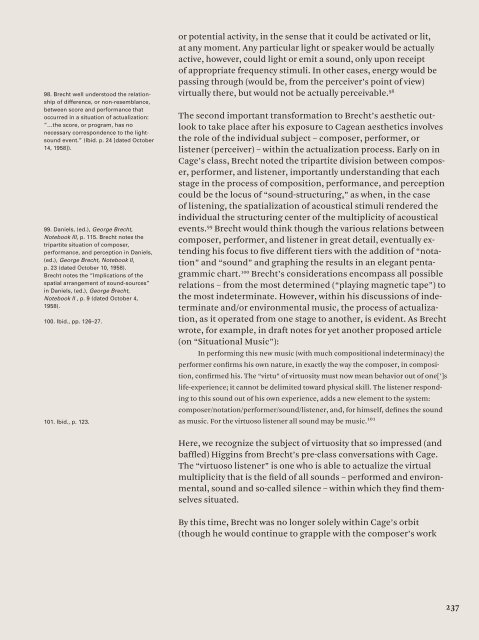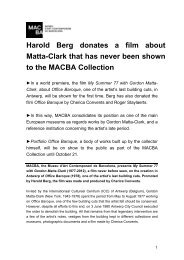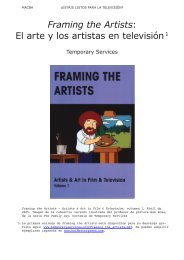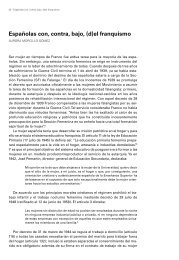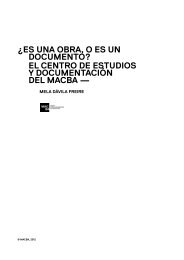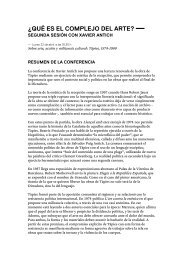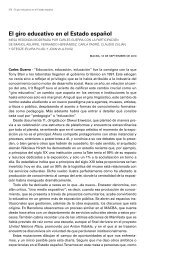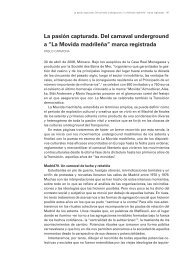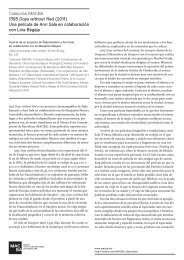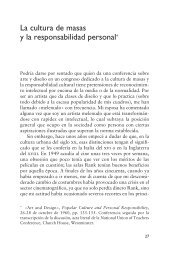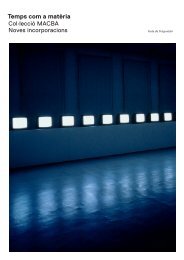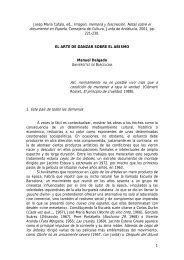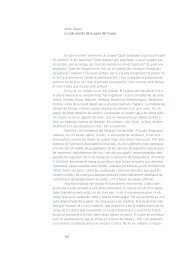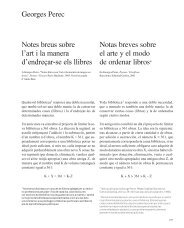Chance, Indeterminacy, Multiplicity - Macba
Chance, Indeterminacy, Multiplicity - Macba
Chance, Indeterminacy, Multiplicity - Macba
Create successful ePaper yourself
Turn your PDF publications into a flip-book with our unique Google optimized e-Paper software.
98. Brecht well understood the relationship<br />
of difference, or non-resemblance,<br />
between score and performance that<br />
occurred in a situation of actualization:<br />
“…the score, or program, has no<br />
necessary correspondence to the lightsound<br />
event.” (Ibid. p. 24 [dated October<br />
14, 1958]).<br />
99. Daniels, (ed.), George Brecht,<br />
Notebook III, p. 115. Brecht notes the<br />
tripartite situation of composer,<br />
performance, and perception in Daniels,<br />
(ed.), George Brecht, Notebook II,<br />
p. 23 (dated October 10, 1958).<br />
Brecht notes the “Implications of the<br />
spatial arrangement of sound-sources”<br />
in Daniels, (ed.), George Brecht,<br />
Notebook II , p. 9 (dated October 4,<br />
1958).<br />
100. Ibid., pp. 126–27.<br />
101. Ibid., p. 123.<br />
or potential activity, in the sense that it could be activated or lit,<br />
at any moment. Any particular light or speaker would be actually<br />
active, however, could light or emit a sound, only upon receipt<br />
of appropriate frequency stimuli. In other cases, energy would be<br />
passing through (would be, from the perceiver’s point of view)<br />
virtually there, but would not be actually perceivable. 98<br />
The second important transformation to Brecht’s aesthetic outlook<br />
to take place after his exposure to Cagean aesthetics involves<br />
the role of the individual subject – composer, performer, or<br />
listener (perceiver) – within the actualization process. Early on in<br />
Cage’s class, Brecht noted the tripartite division between composer,<br />
performer, and listener, importantly understanding that each<br />
stage in the process of composition, performance, and perception<br />
could be the locus of “sound-structuring,” as when, in the case<br />
of listening, the spatialization of acoustical stimuli rendered the<br />
individual the structuring center of the multiplicity of acoustical<br />
events. 99 Brecht would think though the various relations between<br />
composer, performer, and listener in great detail, eventually extending<br />
his focus to five different tiers with the addition of “notation”<br />
and “sound” and graphing the results in an elegant pentagrammic<br />
chart. 100 Brecht’s considerations encompass all possible<br />
relations – from the most determined (“playing magnetic tape”) to<br />
the most indeterminate. However, within his discussions of indeterminate<br />
and/or environmental music, the process of actualization,<br />
as it operated from one stage to another, is evident. As Brecht<br />
wrote, for example, in draft notes for yet another proposed article<br />
(on “Situational Music”):<br />
In performing this new music (with much compositional indeterminacy) the<br />
performer confirms his own nature, in exactly the way the composer, in composition,<br />
confirmed his. The “virtu” of virtuosity must now mean behavior out of one[’]s<br />
life-experience; it cannot be delimited toward physical skill. The listener responding<br />
to this sound out of his own experience, adds a new element to the system:<br />
composer/notation/performer/sound/listener, and, for himself, defines the sound<br />
as music. For the virtuoso listener all sound may be music. 101<br />
Here, we recognize the subject of virtuosity that so impressed (and<br />
baffled) Higgins from Brecht’s pre-class conversations with Cage.<br />
The “virtuoso listener” is one who is able to actualize the virtual<br />
multiplicity that is the field of all sounds – performed and environmental,<br />
sound and so-called silence – within which they find themselves<br />
situated.<br />
By this time, Brecht was no longer solely within Cage’s orbit<br />
(though he would continue to grapple with the composer’s work<br />
237


